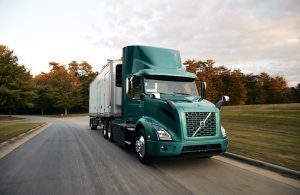FOR IMMEDIATE RELEASE
June 17, 2021
More than 40 businesses are urging Gov. Sisolak to join a multi-state agreement to electrify medium- and heavy-duty vehicles.
Washington, D.C.— Dozens of businesses, including vehicle manufacturing leaders, urged Gov. Steve Sisolak to support the electrification of trucks and buses throughout the state Thursday. The Electrification Coalition delivered a letter signed by 41 businesses, calling on the governor to join in the Multi-State Medium- and Heavy-Duty Zero Emission Vehicle Memorandum of Understanding, pledging that at least 30 percent of all new trucks and buses sold in the state will be zero-emission vehicles by 2030, and 100 percent by 2050. Fifteen states and the District of Columbia have already signed onto the agreement.
“Volvo Trucks is committed to advancing electromobility, both globally and right here in the United States,” said Peter Voorhoeve, president of Volvo Trucks North America. “Gov. Sisolak’s participation in the Multi-State Medium- and Heavy-Duty Zero Emission Vehicle MOU would send a strong message to the market that Nevada is ready for vehicle manufacturers to invest in and deploy zero-emission trucks here. These investments will bring good jobs, clean air, energy security and climate protection.”

Volvo Trucks North America has begun delivering its Volvo VNR Electric Class 8 truck model this year, and the company aims for its global product range to be fossil free by 2040. Other signatories on the letter to Gov. Sisolak include Amply, EVgo, Mack Trucks, Proterra, Rivian, Siemens, Nestlé USA and 27 small businesses throughout the state.
“As a first-generation business owner, my family and I have always viewed the United States as a model for progress,” said Cesivel Ortiz-Lucero, CFO of Charly’s Sound & Tech and Charly’s Auto Accesories in Las Vegas. “Nevada has a responsibility to help move our country’s transportation system off of oil, for the benefit of our economy and our children’s future.”
The United States is the world’s largest consumer of petroleum, accounting for one-fifth of global daily supply; oil accounts for more than 90 percent of energy use in the U.S. transportation sector. The country’s overwhelming dependence on oil has broad implications for public health, national security, the economy and the climate.
Robust public investment and regulatory reform along the EV supply chain has the potential to create more than 500,000 jobs across the United States over a five-year period, according to a report by the Electrification Coalition and Securing America’s Future Energy. Nearly 154,000 of those jobs would stem from incentives that make it less expensive to purchase medium- and heavy-duty EVs like trucks and buses.
“By joining the 15 other states in the Medium- and Heavy-Duty Vehicle MOU, Nevada would signal its commitment to American leadership in the future of transportation, with important implications for job opportunities, energy security and emissions reductions,” said Ben Prochazka, executive director of the Electrification Coalition. “The electrification of transportation is a question of when – not if. Nevada has a chance to help our nation pick up the pace so that we can remain competitive on the global stage.”
Vehicles are a leading source of air pollutants that affect human health. Vehicle emissions contribute to the formation of ground-level ozone, which can trigger health problems such as aggravated asthma, reduced lung capacity and increased susceptibility to respiratory illnesses, including pneumonia and bronchitis. Transportation is also the largest source of greenhouse gas emissions in the United States.
Motor vehicles, particularly those used for freight, are also a major source of particulate matter, which is linked to lung cancer, heart attacks and other health issues. Low-income and minority communities are more likely to be located near highways and other transportation facilities that lead to negative health effects resulting from vehicle emissions.
According to the American Lung Association, widespread adoption of electric vehicles by 2050 would result in an estimated savings of $72 billion per year in health costs nationally. In Nevada alone, the annual benefits would include $746 million in avoided health-impact costs, 65 premature deaths avoided, 767 asthma attacks avoided and 3,724 lost work days avoided.
# # #
About the Electrification Coalition: The Electrification Coalition is a nonpartisan, nonprofit organization committed to policies and actions that facilitate widespread deployment and adoption of plug-in electric vehicles (EVs) to combat the economic, public health, and national security threats posed by America’s dependence on oil.
